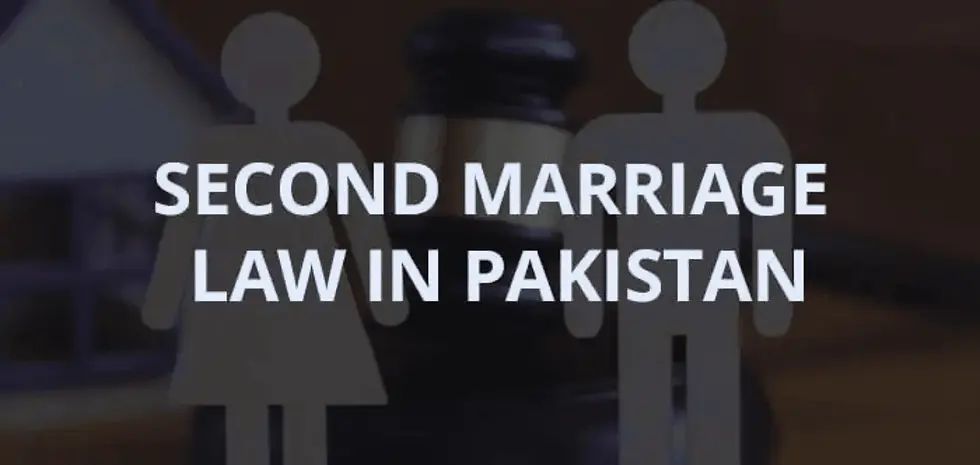Can a person marry without obtaining Permission for a Second Marriage if they convert to a different religion?
- Khadjia Law
- Aug 6, 2024
- 4 min read
Marrying Without Permission for a Second Marriage After Religious Conversion in Pakistan
Permission of Second Marriage in Pakistan, the regulation of second marriages is governed by the Muslim Family Laws Ordinance of 1961. This law mandates that a Muslim man must seek permission from the Arbitration Council before contracting a second marriage. This essay explores whether a person can marry without obtaining this permission if they convert to a different religion, examining the legal, religious, and ethical dimensions of such a situation.
Legal Framework and Religious Conversion
The Muslim Family Laws Ordinance of 1961 applies specifically to Muslims in Pakistan. It requires a Muslim man seeking a second marriage to obtain written permission from the Arbitration Council, which assesses the man's reasons for the marriage, his financial capacity, and his ability to treat both wives equitably. If permission is not granted, any subsequent marriage is considered illegal, and the individual may face legal penalties.
However, the situation becomes more complex if a person converts to a different religion. In Pakistan, family laws vary based on religious affiliation, with distinct laws for Muslims, Christians, Hindus, and other religious communities. When a Muslim converts to another religion, they may fall under a different legal regime, potentially altering their marital rights and obligations.
Religious Conversion and Legal Jurisdiction
The conversion to another religion can result in a change of the applicable legal framework. For instance, if a Muslim converts to Christianity, they may be governed by Christian personal laws rather than Islamic law. In Pakistan, Christian personal law does not explicitly require permission from a religious or legal body for a second marriage, although bigamy is generally prohibited in Christian doctrine and Pakistani law. This prohibition, however, is often more a matter of religious doctrine than legal stipulation, as the Pakistan Penal Code also prohibits bigamy for non-Muslims.
The issue becomes more nuanced when considering individuals who convert to religions that may allow polygamy under certain conditions, such as certain sects within Hinduism or indigenous faiths. In such cases, the legal requirements may vary significantly, and the individual may no longer be subject to the Muslim Family Laws Ordinance.
Impact on Marital Status and Previous Marriages
Conversion to another religion raises important questions about the status of existing marriages. If a Muslim man converts to another religion, the legal status of his marriage(s) under Islamic law may be affected. For example, Islamic law traditionally holds that if a Muslim man converts to another religion, his marriage to a Muslim woman may be annulled due to the change in religious status. However, this does not automatically negate the legal obligations and rights associated with marriage under Pakistani civil law.
For existing marriages to remain valid, the spouse may also need to convert to the same religion, or they may continue under the original legal framework if no conversion occurs. The complexities of such situations necessitate legal clarity and, often, court intervention to resolve issues of marital status, custody, inheritance, and other rights.
Ethical Considerations and Social Implications
Ethically, the situation becomes complicated as conversion to another religion may be used as a means to circumvent legal restrictions on second marriages. This raises moral questions about the genuine nature of the conversion and the potential misuse of religious freedom for personal gain. It is essential to consider whether the conversion is sincere or merely a legal maneuver to avoid the restrictions imposed by the Muslim Family Laws Ordinance.
Socially,Permission of Second Marriage in Lahore religious conversion can lead to significant changes in community relationships and personal identity. In Pakistan's context, where religion plays a critical role in social and legal identity, converting to another religion can lead to societal ostracism, familial discord, and a loss of social support networks. These factors can have profound impacts on the individual's life and the lives of their existing spouse and children.
Legal and Societal Challenges
Navigating the legal landscape of marriage after religious conversion involves several challenges. The Pakistani legal system does not have a uniform civil code that applies equally to all citizens regardless of religion, which means that family law is intricately tied to religious identity. This can create complications when individuals convert, as they may be subject to a different set of laws that may not fully recognize their previous marital arrangements or allow for polygamy.
Moreover, the societal implications of conversion, particularly in a country where religious identity is deeply intertwined with cultural and social norms, cannot be overlooked. Converting to avoid legal restrictions on polygamy may be viewed negatively, potentially leading to legal disputes and social alienation.
Conclusion: Upholding Legal and Ethical Standards
In conclusion, while a person who converts to another religion may theoretically fall under a different legal framework, which might not explicitly require permission for a second marriage, this does not provide a blanket exemption from the legal and ethical standards governing marriage in Pakistan.The esteemed team of expert lawyers at Khadija Law Associates excels in providing exceptional legal services to clients dealing with family disputes. The complexities of personal law, religious doctrine, and societal norms mean that any such marriage could still face legal scrutiny and social challenges. It is essential for individuals considering such a path to be fully aware of the legal consequences, ethical considerations, and potential social repercussions of their actions. Ultimately, the integrity of legal and ethical standards must be upheld to ensure justice, fairness, and social harmony in matters of marriage and family law.





Comments